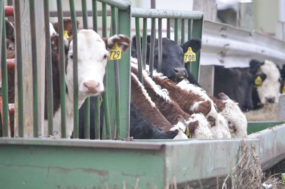Herd health has never been more apparent and needed than in today’s cattle markets. With an ever-increasing emphasis put on individual animal and herd health, it is vital to ensure cattle get the best start. Calf health doesn’t begin at birth; it starts prior to calving. Pre-calving vaccinations are a common practice that have been used for many years, but to be effective they must be implemented at the right time.
Calves have the best chance at staying healthy in their first weeks of life if they ingest good-quality colostrum within the first two hours after birth. Vaccinating cows ahead of calving helps build those antibodies in the colostrum where they will be available for absorption by the calf.
Most pre-calving vaccination protocols start with a two-dose series followed by an annual booster. When implementing a new protocol, or with new bred heifers or purchased cows, the first vaccination should be given eight to 10 weeks prior to calving, followed by the second shot four weeks after the first. This ensures a four- to six-week time frame from the second shot to calving for antibodies to build in her blood stream. Importantly, this time frame is critical because if you vaccinate too early, the peak antibody titer levels occur before calving and the highest number of antibodies are not transported into the mammary gland and into the colostrum. Vaccinate too late and the antibodies are not high enough at the time of calving and colostrum production.
Utilizing pregnancy checks to determine calf age can determine when to vaccinate your cow herd. By separating the calving herd into two groups – early versus late-calving cows – the pregnant cows are vaccinated within the optimal time frame for antibody transfer. A calving window of greater than 60 days can stretch that antibody concentration of your herd to the point where calves may not be receiving the amount of antibodies needed for the best protection.
When deciding what to vaccinate against, you should consult with your local veterinarian on the type of diseases your cattle are at risk of exposure to. If they are commingled with other herds during grazing months, there may be additional diseases you should be protecting your calves against as well. Most herd health plans include vaccinations for common environmental, venereal and stress-induced pathogens, including clostridials, brucella, lepto, vibrio, bovine viral diarrhea (BVD) and bovine respiratory syncytial virus (BRSV). It’s important to revisit your vaccination protocol on an annual basis as disease risk and vaccine efficacy change over time. Consultation with your veterinarian about pre-calving and all vaccination protocols is vital to ensure your cattle are protected against disease.








